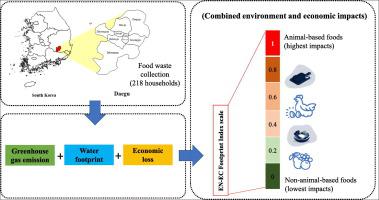Science of the Total Environment ( IF 8.2 ) Pub Date : 2021-02-18 , DOI: 10.1016/j.scitotenv.2021.145928 Bashir Adelodun , Sang Hyun Kim , Golden Odey , Kyung-Sook Choi

|
While the global food demand has continued to increase, the enormous natural resources required for its production are limited, in addition to the accompanying environmental degradation. Despite all these, food waste generation continues unabated, especially at the household level, further compounding the environmental impacts, economic cost, and food security issues. In this study, granular primary data of edible household food waste using direct-weighing from 218 households in Daegu, South Korea was used to assess the environmental (carbon footprint, and water footprint) and economic (wasted cost) impacts associated with their wastage. For the first time, the Environmental-Economic (EN-EC) Footprint index is proposed as a single indicator for environmental and economic impacts to assess the hotspot food waste products among the selected 42 major food waste items. This study presents that the selected food products had a significant contribution to an average edible food waste generation of 0.73 ± 0.06 kg (per household/day), 0.71 ± 0.05 kg CO2eq of GHG emissions, 0.46 ± 0.04 m3 of water footprint, and 3855.93 ± 527.27 won of economic loss, respectively. Based on the newly developed EN-EC Footprint index, we found that wasted animal-based food products had relatively high environmental and economic losses compared to non-animal-based food products. The findings of this study presented a novel method of estimating combined environmental and economic impacts associated with household food waste, which may further act as convenient guides for the waste management authorities and policymakers in addressing the mitigation of household food waste impacts.
中文翻译:

使用新的环境经济足迹(EN-EC)指数评估家庭食物垃圾的环境和经济方面:以韩国大邱市为例
尽管全球粮食需求持续增长,但伴随着环境恶化,其生产所需的巨大自然资源也受到限制。尽管如此,食物垃圾的产生仍在继续,特别是在家庭一级,这进一步加剧了环境影响,经济成本和粮食安全问题。在这项研究中,使用来自韩国大邱218户家庭的直接称重的可食用家庭食物垃圾的主要数据来评估与浪费相关的环境(碳足迹和水足迹)和经济(浪费成本)影响。首次,建议将环境经济(EN-EC)足迹指数作为环境和经济影响的单个指标,以评估所选42种主要食物垃圾项目中的热点食物垃圾产品。这项研究表明,所选食物对平均可食用食物垃圾产生量(0.73±0.06千克(每户/日),0.71±0.05千克二氧化碳)有显着贡献2 eq的温室气体排放量,0.46±0.04 m 3的水足迹和3855.93±527.27韩元的经济损失。根据新开发的EN-EC足迹指数,我们发现与非动物性食品相比,浪费的动物性食品具有相对较高的环境和经济损失。这项研究的结果提出了一种估算与家庭食物垃圾相关的综合环境和经济影响的新颖方法,这可能进一步为废物管理当局和政策制定者解决家庭食物垃圾影响的缓解提供方便的指南。











































 京公网安备 11010802027423号
京公网安备 11010802027423号